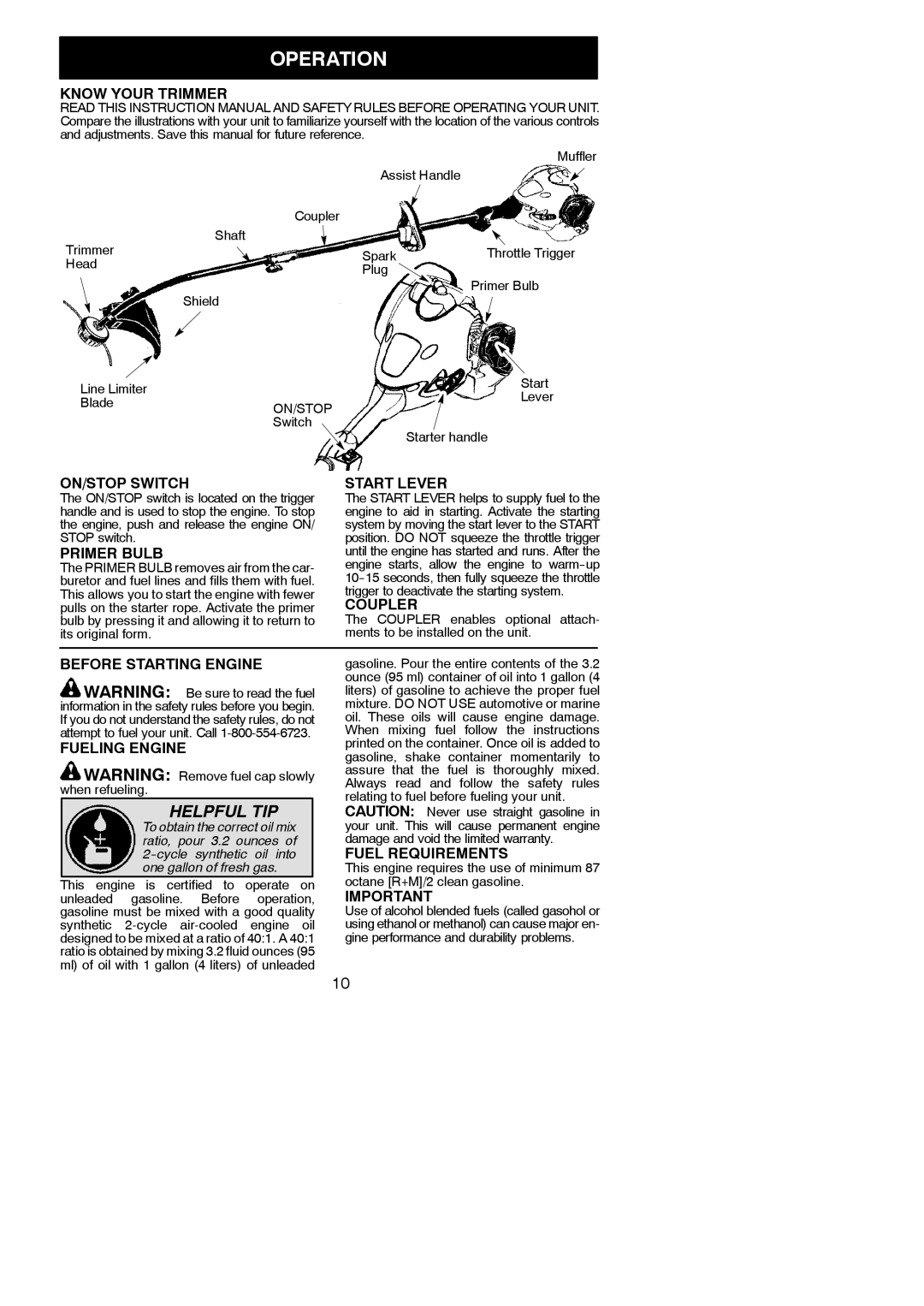
OPERATION
KNOW YOUR TRIMMER
READ THIS INSTRUCTION MANUAL AND SAFETY RULES BEFORE OPERATING YOUR UNIT. Compare the illustrations with your unit to familiarize yourself with the location of the various controls and adjustments. Save this manual for future reference.
|
|
|
|
|
| Muffler | |
|
|
|
| Assist Handle |
|
|
|
|
| Coupler |
|
|
|
| |
| Shaft |
|
|
|
|
|
|
| Trimmer |
|
| Spark | Throttle Trigger | ||
| Head |
|
| Plug |
|
|
|
|
|
|
|
|
|
| |
| Shield |
|
|
| Primer Bulb |
|
|
|
|
|
|
|
|
| |
|
|
| Start | ||||
| Line Limiter |
|
|
| |||
|
|
|
| Lever | |||
| Blade | ON/STOP |
| ||||
|
|
|
|
| |||
|
|
|
|
|
| ||
|
| Switch | Starter handle | ||||
|
|
|
| ||||
ON/STOP SWITCH |
|
| START LEVER |
|
|
| |
The ON/STOP switch is located on the trigger | The START LEVER helps to supply fuel to the | ||||||
handle and is used to stop the engine. To stop | engine to aid in starting. Activate the starting | ||||||
the engine, push and release the engine ON/ | system by moving the start lever to the START | ||||||
STOP switch. |
|
| position. DO NOT squeeze the throttle trigger | ||||
PRIMER BULB |
|
| until the engine has started and runs. After the | ||||
The PRIMER BULB removes air from the car- | engine starts, allow the engine to | ||||||
buretor and fuel lines and fills them with fuel. | |||||||
This allows you to start the engine with fewer | trigger to deactivate the starting system. | ||||||
pulls on the starter rope. Activate the primer | COUPLER |
|
|
| |||
bulb by pressing it and allowing it to return to | The COUPLER enables optional attach- | ||||||
its original form. |
|
| ments to be installed on the unit. | ||||
|
|
|
|
|
| ||
BEFORE STARTING ENGINE |
|
| gasoline. Pour the entire contents of the 3.2 | ||||
| WARNING: Be sure to read the fuel | ounce (95 ml) container of oil into 1 gallon (4 | |||||
| liters) of gasoline to achieve the proper fuel | ||||||
information in the safety rules before you begin. | mixture. DO NOT USE automotive or marine | ||||||
If you do not understand the safety rules, do not | oil. These oils will cause engine damage. | ||||||
attempt to fuel your unit. Call | When mixing fuel follow the instructions | ||||||
FUELING ENGINE |
|
| printed on the container. Once oil is added to | ||||
|
| gasoline, shake container momentarily to | |||||
|
|
|
| ||||
| WARNING: Remove fuel cap slowly | assure that the fuel is thoroughly mixed. | |||||
when refueling. |
|
| Always read and follow the safety rules | ||||
|
| relating to fuel before fueling your unit. | |||||
| HELPFUL TIP |
| CAUTION: Never use straight gasoline in | ||||
| To obtain the correct oil mix |
| your unit. This will cause permanent engine | ||||
| ratio, pour 3.2 ounces of |
| damage and void the limited warranty. | ||||
|
| FUEL REQUIREMENTS | |||||
| one gallon of fresh gas. |
| This engine requires the use of minimum 87 | ||||
| This engine is certified to operate on |
| octane [R+M]/2 clean gasoline. | ||||
unleaded gasoline. Before operation, | IMPORTANT |
|
|
| |||
gasoline must be mixed with a good quality | Use of alcohol blended fuels (called gasohol or | ||||||
synthetic | using ethanol or methanol) can cause major en- | ||||||
designed to be mixed at a ratio of 40:1. A 40:1 | gine performance and durability problems. | ||||||
ratio is obtained by mixing 3.2 fluid ounces (95 ml) of oil with 1 gallon (4 liters) of unleaded
10
